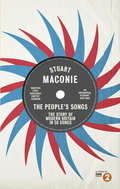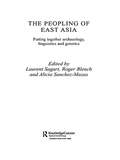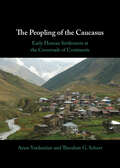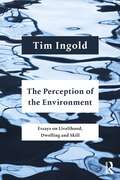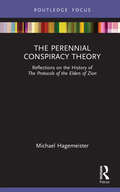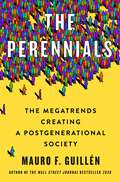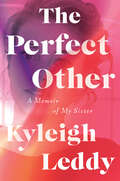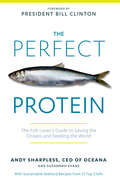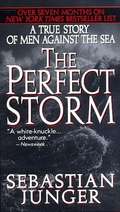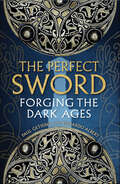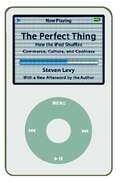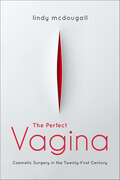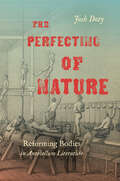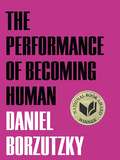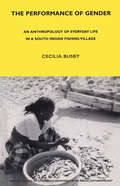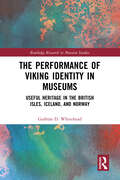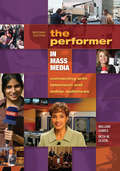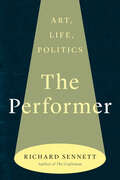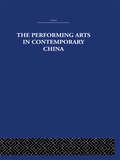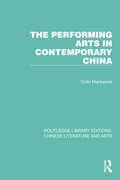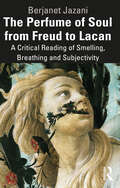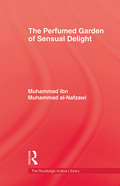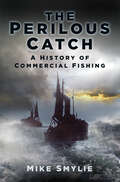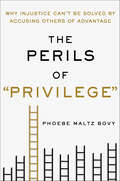- Table View
- List View
The People’s Songs: The Story of Modern Britain in 50 Records
by Stuart MaconieThese are the songs that we have listened to, laughed to, loved to and laboured to, as well as downed tools and danced to. Covering the last seven decades, Stuart Maconie looks at the songs that have sound tracked our changing times, and – just sometimes – changed the way we feel. Beginning with Vera Lynn’s ‘We’ll Meet Again’, a song that reassured a nation parted from their loved ones by the turmoil of war, and culminating with the manic energy of ‘Bonkers’, Dizzee Rascal’s anthem for the push and rush of the 21st century inner city, The People’s Songs takes a tour of our island’s pop music, and asks what it means to us. This is not a rock critique about the 50 greatest tracks ever recorded. Rather, it is a celebration of songs that tell us something about a changing Britain during the dramatic and kaleidoscopic period from the Second World War to the present day. Here are songs about work, war, class, leisure, race, family, drugs, sex, patriotism and more, recorded in times of prosperity or poverty. This is the music that inspired haircuts and dance crazes, but also protest and social change. The companion to Stuart Maconie’s landmark Radio 2 series, The People’s Songs shows us the power of ‘cheap’ pop music, one of Britain’s greatest exports. These are the songs we worked to and partied to, and grown up and grown old to – from ‘A Whiter Shade of Pale’ to ‘Rehab', ‘She Loves You’ to ‘Star Man’, ‘Dedicated Follower of Fashion’ to ‘Radio Ga Ga’.
The Peopling of East Asia: Putting Together Archaeology, Linguistics and Genetics
by Alicia Sanchez-Mazas Roger Blench Laurent SagartOne of the most dynamic research areas in the prehistory of East Asian regions is the synthesis of the findings of archaeology, linguistics and genetics. Several countries have only recently opened to field research and highly active local groups have made possible a raft of collaborative studies that would have been impossible even a decade ago. This book presents an overview of the most recent findings in all these fields. It will be of great interest to scholars of all disciplines working on the reconstruction of the East Asian past.
The Peopling of the Caucasus: Early Human Settlement at the Crossroads of Continents
by Aram Yardumian Theodore G. SchurrLocated at the crossroads of Europe, Asia, and the Middle East, the Caucasus region has played a critical role in the dissemination of languages, ideas, and cultures since prehistoric times. In this study, Aram Yardumian and Theodore Schurr explore the dispersal of human groups in the Caucasus beginning in the Palaeolithic period. Using evidence from archaeology, linguistics, and anthropological genetics, they trace changes in settlement patterns, cultural practices, and genetic variation. Highlighting the region's ecological diversity, natural resources, and agricultural productivity, Yardumian and Schurr reconstruct the timings and likely migration routes for human settlement following the Last Glacial Maximum, as well as the possible connections to regional economies for these expansions. Based on analysis of archaeological site reports, linguistic relationships, and genetic data previously published separately and in different languages, their synthesis of the most up to date evidence opens new vistas into the chronology and human dynamics of the Caucasus' prehistory.
The Perception of the Environment: Essays on Livelihood, Dwelling and Skill
by Tim IngoldIn this work Tim Ingold offers a persuasive new approach to understanding how human beings perceive their surroundings. He argues that what we are used to calling cultural variation consists, in the first place, of variations in skill. Neither innate nor acquired, skills are grown, incorporated into the human organism through practice and training in an environment. They are thus as much biological as cultural. To account for the generation of skills we have therefore to understand the dynamics of development. And this in turn calls for an ecological approach that situates practitioners in the context of an active engagement with the constituents of their surroundings. The twenty-three essays comprising this book focus in turn on the procurement of livelihood, on what it means to ‘dwell’, and on the nature of skill, weaving together approaches from social anthropology, ecological psychology, developmental biology and phenomenology in a way that has never been attempted before. The book is set to revolutionise the way we think about what is ‘biological’ and ‘cultural’ in humans, about evolution and history, and indeed about what it means for human beings – at once organisms and persons – to inhabit an environment. The Perception of the Environment will be essential reading not only for anthropologists but also for biologists, psychologists, archaeologists, geographers and philosophers. This edition includes a new Preface by the author.
The Perennial Conspiracy Theory: Reflections on the History of the Protocols of the Elders of Zion (Routledge Studies in Fascism and the Far Right)
by Michael HagemeisterThe Perennial Conspiracy Theory is a collection of essays on The Protocols of the Elders of Zion, a fake document which has created a pernicious antisemitic conspiracy theory. The author analyses the murky origins of this notorious forgery and the contested claims of authorship. He explores the impact of the Protocols on various countries during the interwar years including Soviet Russia, the United Kingdom, France, Nazi Germany, and the United States. He also profiles figures closely associated with the dissemination of antisemitic conspiracy theories, such as Sergei Nilus and Leslie Fry, as well as examining the controversies arising from the famous Bern trial related to the Protocols. The book concludes with an assessment of the ongoing influence of the Protocols in post-Soviet Russia. This volume will be of interest to researchers and students working in the fields of antisemitism, conspiracy theories, the far right, Jewish studies, and modern history.
The Perennials: The Megatrends Creating a Postgenerational Society
by Mauro F. GuillénGet the best from accelerating social change with the new book from the bestselling author of 2030 and “acclaimed thought leader” (Kirkus), Mauro Guillén. Adam Grant praises how the book "invites us to rethink our careers, our families, and our future plans.” Find out why business leaders and bestselling authors around the world are calling the book "sharply relevant and necessary" (William P. Lauder), "insightful and deeply researched" (Richard Florida), and "A must read" (Mohammed A. El-Erian). In today’s world, the acceleration of megatrends – increasing longevity and the explosion of technology among many others – are transforming life as we now know it.In The Perennials, bestselling author of 2030 Mauro Guillén unpacks a sweeping societal shift triggered by demographic and technological transformation. Guillén argues that outmoded terms like Boomers, Gen X, Millennials, and Gen Z have long been used to pigeonhole us into rigid categories and life stages, artificially preventing people from reaching their full potential. A new postgenerational workforce known as “perennials” – individuals who are not pitted against each other either by their age or experience – makes it possible to liberate scores of people from the constraints of the sequential model of life and level the playing field so that everyone has a chance at living a rewarding life. Guillén unveils how this generational revolution will impact young people just entering the workforce as well as those who are living and working longer. This multigenerational revolution is already happening and Mauro Guillén identifies the specific cultural, organizational and policy changes that need to be made in order to switch to a new template and usher in a new era of innovation powered by the perennials.
The Perfect Other: A Memoir of My Sister
by Kyleigh LeddyAll Kait Leddy had ever wanted was a little sister. When Kyleigh was born, they were inseparable; Kait would protect her, include her, cuddle and comfort her, and, to Kyleigh, her big sister was her whole world.As they grew, however, and as Kait entered adolescence, her personality began to change. She was lashing out emotionally and physically, and losing touch with reality in certain ways. The family struggled to keep this side of Kait private—at school and in her social life, she was still the gorgeous, effervescent life of the party with a modeling career ahead of her and big dreams. But slowly, things began to shatter, and Kyleigh could only watch in horror as her perfect sibling&’s world collapsed around her. Kait was institutionalized with what would eventually be diagnosed as schizophrenia, leaving Kyleigh and their mother to handle the burden, shame, and guilt alone.Then, in January 2014, Kait disappeared. Though they never found her body, security footage showed her making her way onto a big bridge over a river, where it is presumed that she jumped. Kyleigh is left wondering: What could she have done differently? How could this shining light be gone? And how will she find peace without her sister to guide her way there?
The Perfect Protein: The Fish Lover's Guide to Saving the Oceans and Feeding the World
by Andy Sharpless Suzannah EvansThe planet will be home to more than 9 billion people by 2050, and we're already seeing critical levels of famine around the world mirrored by growing obesity in developed nations. In The Perfect Protein, Andy Sharpless maintains that protecting wild seafood can help combat both issues, because seafood is the healthiest, cheapest, most environmentally friendly source of protein on earth. While the conservation community has taken a simplistic, save-the-whales approach when it comes to oceans, Sharpless contends that we must save the world's seafood not just to protect marine life and biodiversity but to stave off the coming humanitarian crisis. With high demand for predator species like tuna and salmon, wealthy nations like the U.S. convert "reduction" species such as anchovies, mackerel, and sardines into feed for salmon and other farmed animals—even though these overlooked fish are packed with health-boosting Omega-3 fatty acids and could feed millions. By establishing science-based quotas, protecting wild habitats, and reducing bycatch (and treating anchovies and their like as food, not feed), Sharpless believes that effective ocean stewardship can put healthy, sustainable seafood on the table forever. To that end, Oceana has tapped 20-plus chefs, including Mario Batali, Eric Ripert, and Jose Andres for recipes that give us all a role to play in this revolutionary mission: to save the fish so that we can eat more fish.
The Perfect Storm: A True Story of Men Against the Sea
by Sebastian JungerThe bestselling book that became the blockbuster film starring George Clooney, Mark Wahlberg, and Diane Lane.<P> In October 1991, three weather systems collided off the coast of Nova Scotia to create a storm of singular fury, boasting waves over one hundred feet high. Among its victims was the Gloucester, Massachusetts-based swordfishing boat the Andrea Gail, which vanished with all six crew members aboard.<P> "Drifting down on swimmers is standard rescue procedure, but the seas are so violent that Buschor keeps getting flung out of reach. There are times when he's thirty feet higher than the men trying to rescue him. . . . [I]f the boat's not going to Buschor, Buschor's going to have to go to it. SWIM! they scream over the rail. SWIM! Buschor rips off his gloves and hood and starts swimming for his life."<P> It was the storm of the century, boasting waves over one hundred feet high a tempest created by so rare a combination of factors that meteorologists deemed it "the perfect storm." When it struck in October 1991, there was virtually no warning. "She's comin' on, boys, and she's comin' on strong," radioed Captain Billy Tyne of the Andrea Gail off the coast of Nova Scotia, and soon afterward the boat and its crew of six disappeared without a trace. <P> In a book taut with the fury of the elements, Sebastian Junger takes us deep into the heart of the storm, depicting with vivid detail the courage, terror, and awe that surface in such a gale. Junger illuminates a world of swordfishermen consumed by the dangerous but lucrative trade of offshore fishing, "a young man's game, a single man's game," and gives us a glimpse of their lives in the tough fishing port of Gloucester, Massachusetts; he recreates the last moments of the Andrea Gail crew and recounts the daring high-seas rescues that made heroes of some and victims of others; and he weaves together the history of the fishing industry, the science of storms, and the candid accounts of the people whose lives the storm touched, to produce a rich and informed narrative. The Perfect Storm is a real-life thriller that will leave readers with the taste of salt air on their tongues and a sense of terror of the deep.
The Perfect Sword: Forging the Dark Ages
by Paul Gething Edoardo AlbertThe story of the Bamburgh Sword – one of the finest swords ever forged. In 2000, archaeologist Paul Gething rediscovered a sword. An unprepossessing length of rusty metal, it had been left in a suitcase for thirty years. But Paul had a suspicion that the sword had more to tell than appeared, so he sent it for specialist tests. When the results came back, he realised that what he had in his possession was possibly the finest, and certainly the most complex, sword ever made, which had been forged in seventh-century Northumberland by an anonymous swordsmith. This is the story of the Bamburgh Sword – of how and why it was made, who made it and what it meant to the warriors and kings who wielded it over three centuries. It is also the remarkable story of the archaeologists and swordsmiths who found, studied and attempted to recreate the weapon using only the materials and technologies available to the original smith.
The Perfect Thing: How the iPod Shuffles Commerce, Culture, and Coolness
by Steven LevyOn October 23, 2001, Apple Computer, a company known for its chic, cutting-edge technology -- if not necessarily for its dominant market share -- launched a product with an enticing promise: You can carry an entire music collection in your pocket. It was called the iPod. What happened next exceeded the company's wildest dreams. Over 50 million people have inserted the device's distinctive white buds into their ears, and the iPod has become a global obsession. The Perfect Thing is the definitive account, from design and marketing to startling impact, of Apple's iPod, the signature device of our young century. Besides being one of the most successful consumer products in decades, the iPod has changed our behavior and even our society. It has transformed Apple from a computer company into a consumer electronics giant. It has remolded the music business, altering not only the means of distribution but even the ways in which people enjoy and think about music. Its ubiquity and its universally acknowledged coolness have made it a symbol for the digital age itself, with commentators remarking on "the iPod generation." Now the iPod is beginning to transform the broadcast industry, too, as podcasting becomes a way to access radio and television programming. Meanwhile millions of Podheads obsess about their gizmo, reveling in the personal soundtrack it offers them, basking in the social cachet it lends them, even wondering whether the device itself has its own musical preferences. Steven Levy, the chief technology correspondent for Newsweek magazine and a longtime Apple watcher, is the ideal writer to tell the iPod's tale. He has had access to all the key players in the iPod story, including Steve Jobs, Apple's charismatic cofounder and CEO, whom Levy has known for over twenty years. Detailing for the first time the complete story of the creation of the iPod, Levy explains why Apple succeeded brilliantly with its version of the MP3 player when other companies didn't get it right, and how Jobs was able to convince the bosses at the big record labels to license their music for Apple's groundbreaking iTunes Store. (We even learn why the iPod is white.) Besides his inside view of Apple, Levy draws on his experiences covering Napster and attending Supreme Court arguments on copyright (as well as his own travels on the iPod's click wheel) to address all of the fascinating issues -- technical, legal, social, and musical -- that the iPod raises. Borrowing one of the definitive qualities of the iPod itself, The Perfect Thing shuffles the book format. Each chapter of this book was written to stand on its own, a deeply researched, wittily observed take on a different aspect of the iPod. The sequence of the chapters in the book has been shuffled in different copies, with only the opening and concluding sections excepted. "Shuffle" is a hallmark of the digital age -- and The Perfect Thing, via sharp, insightful reporting, is the perfect guide to the deceptively diminutive gadget embodying our era.
The Perfect Vagina: Cosmetic Surgery in the Twenty-First Century
by Lindy McDougallIn the West, a specific ideal for female genitalia has emerged: one of absence, a "clean slit," attained through the removal of pubic hair and, increasingly, through female genital cosmetic surgery known as FGCS.In The Perfect Vagina: Cosmetic Surgery in the Twenty-First Century, Lindy McDougall provides an ethnographic account of women who choose FGCS in Australia and the physicians who perform these procedures, both in Australia and globally, while also examining the environment in which surgeons and women come together. Physicians have a vested interest in establishing this surgery as valid medical intervention, despite majority medical opinion explicitly acknowledging that a wide range of genital variation is normal. McDougall offers a nuanced picture of why and how these procedures are performed and draws parallels between FGCS and anthropological discussions of female genital circumcision (cutting). Using the neologism biomagical, she argues that cosmetic surgery functions as both ritual and sacrifice due to its promise of transformation while simultaneously submitting the body to the risks and pain of surgery, thus exposing biomedicine as an increasingly cultural and commercial pursuit.The Perfect Vagina highlights the complexities involved with FGCS, its role in Western beauty culture, and the creation and control of body image in countries where self-care is valorized and medicine is increasingly harnessed for enhancement as well as health.
The Perfecting of Nature: Reforming Bodies in Antebellum Literature
by Josh DotyThe nineteenth century saw a marked change in how Americans viewed and understood the human form. These new ways of understanding the body reflect how Americans were beginning to see the body's constituent parts as interconnected. From the transcendentalists' idealized concept of self to the rise of Darwinian theory after the Civil War, the era and its writers redefined the human body as both deeply reactive and malleable. Josh Doty explores antebellum American conceptions of bioplasticity—the body's ability to react and change from interior and exterior forces—and argues that literature helped to shape the cultural reception of these ideas. These new ways of thinking about the body's responsiveness to its surroundings enabled exercise fanatics, cold-water bathers, cookbook authors, and everyday readers to understand the tractable body as a way to reform the United States at the physiological level. Doty weaves together analysis of religious texts, nutritional guides, and canonical literature to show the fluid relationship among bodies, literature, and culture in nineteenth-century America.
The Performance Of Becoming Human
by Daniel BorzutzkyFollowing in the path of his acclaimed collections THE BOOK OF INTERFERING BODIES (Nightboat, 2011) and IN THE MURMURS OF THE ROTTEN CARCASS ECONOMY (Nightboat, 2015), Daniel Borzutzky returns to confront the various ways nation-states and their bureaucracies absorb and destroy communities and economies. <P><P> In THE PERFORMANCE OF BECOMING HUMAN, the bay of Valparaiso merges into the western shore of Lake Michigan, where Borzutzky continues his poetic investigation into the political and economic violence shared by Chicago and Chile, two places integral to his personal formation. To become human is to navigate borders, including the fuzzy borders of institutions, the economies of privatization, overdevelopment, and underdevelopment, under which humans endure state-sanctioned and systemic abuses in cities, villages, deserts. <P> National Book Award Winner
The Performance of Gender: An Anthropology of Everyday Life in a South Indian Fishing Village (London School Of Economics Monographs On Social Anthropology Ser. #Vol. 71)
by Cecilia BusbyThe Performance of Gender presents a vivid description of everyday life in order to explore the concept of performance for an anthropology of gender. A detailed and evocotive account of the lives of men and women in a South Indian fishing community reveals new ways of framing gender relations, the body and kinship. The ethnographic account is set within the context of social and cultural theory, notably the ideas of Judith Butler, Pierre Bourdieu and Michel Foucault. The study sheds new light on the ways in which gender is understood as both performative, that is enacted through everyday practices, and also substantial and embodied, that is marked out in the separate sexual fluids and procreative capacities of husbands and wives.
The Performance of Viking Identity in Museums: Useful Heritage in the British Isles, Iceland, and Norway (Routledge Research in Museum Studies)
by Guðrún D. WhiteheadThe Performance of Viking Identity in Museums explores the representations and uses of Vikings in museums across Iceland, British Isles and Norway.Drawing on theories from history, philosophy, museology, and sociology, the book analyses how the Viking myth is used by visitors to make sense of present-day society, culture, and politics and the role of museums in this meaning-making process. Demonstrating that the Viking myth is present in collective memory and plays an important role in the construction and modification of collective, national, and personal identities, the book analyses this process through the framework of museums and their visitors. Identifying museums as places where heritage, identity and social norms are affirmed and reflected upon, Whitehead demonstrates that all countries use their Viking heritage to define their identity on a local and international level - through tourist attractions such as museums and other Viking-related monuments and merchandise.Providing readers with an insight into Vikings and their social relevance today, The Performance of Viking Identity in Museums will be of great interest to academics and researchers across the social and human sciences. It should also be essential reading for museum professionals working in museums around the world.
The Performer in Mass Media: Connecting with Television and Online Audiences
by Beth OlsonThis book is a concise guide written by two individuals who have been there—under the lights and in front of the camera. Its no-nonsense approach offers readers practical advice about on-camera performance, including key aspects of voice, movement, communication and appearance. It gives them a foundation for working in the studio, in the field and in front of an audience; it is ideal for media performers of any type, including those who work as reporters, company spokespersons, or community advocates.Recommendations include how to properly position oneself for a shot, how to improve articulation, how to deal with stress and how to best perform online. "Try-It-Out" exercises help readers put what they have learned into practice and prepare to be on camera. Key terms are bolded in the chapters and are collected in a book-end Glossary for easy reference.
The Performer: Art, Life, Politics
by Richard SennettAn acclaimed sociologist&’s exploration of the connections among performances in life, art, and politics In The Performer, Richard Sennett explores the relations between performing in art (particularly music), politics, and everyday experience. It focuses on the bodily and physical dimensions of performing, rather than on words. Sennett is particularly attuned to the ways in which the rituals of ordinary life are performances. The book draws on history and sociology, and more personally on the author&’s early career as a professional cellist, as well as on his later work as a city planner and social thinker. It traces the evolution of performing spaces in the city; the emergence of actors, musicians, and dancers as independent artists; the inequality between performer and spectator; the uneasy relations between artistic creation and social and religious ritual; the uses and abuses of acting by politicians. The Janus-faced art of performing is both destructive and civilizing.
The Performing Arts in Contemporary China
by Colin MackerrasFirst published in 1981.The overthrow of the 'gang of four' in October 1976 had profound effects in all areas of Chinese society, and probably nowhere can this be more clearly seen than in the performing arts. Jiang Qing, Mao Zedong's widow, was strongly interested in the performing arts and exercised great influence over them. This book describes her influence and the effects its removal had on the arts. Although the period covered is mainly that since the death of Mao, there is also considerable reference to the years following the Cultural Revolution.
The Performing Arts in Contemporary China (Routledge Library Editions: Chinese Literature and Arts #17)
by Colin MackerrasThe overthrow of the ‘gang of four’ in 1976 had profound effects in all areas of Chinese society, and probably nowhere can this be seen more clearly than in the performing arts. Jiang Qing, Mao Zedong’s widow, was strongly interested in the performing arts and exercised great influence over them. Professor Mackerras describes this influence and the effects its removal had on the arts in the years after Mao’s death, as well as in the years following the Cultural Revolution. This book, first published in 1981, deals not only with opera, the spoken play, music and dance but also with cinema, describing how in all these cases the Chinese have adapted traditional art forms for political, social and propagandist purposes, both domestic and international. It charts the transformations that have taken place in all the multiple aspects of the performing arts and sets them against the development of Chinese society as a whole. It also looks at the role of the actor and performer in society, including their training, social status and livelihood.
The Perfume of Soul from Freud to Lacan: A Critical Reading of Smelling, Breathing and Subjectivity
by Berjanet JazaniThe Perfume of Soul from Freud to Lacan seeks to understand the human sense of smell and its marks on our subjectivity from a psychoanalytic perspective.Accessibly written, the book considers whether our understanding of the sense of smell and odours in culture has changed over time, and where we locate olfaction in theories of psychoanalysis. Beginning with the theorisation of the sense of smell in philosophy and medicine, Berjanet Jazani explores what treatment of this sense we can find in historical and contemporary linguistic and cultural context. Jazani then takes examples from the psychoanalytic clinic as well as cultural references, from cinema to ancient literature, to elaborate the marks of the olfactory experiences on our subjectivity and sexuality. Lacanian theories, clinical anecdotes and autobiographical references are woven together to raise some critical questions about the law of odours as well as the invisible marks of breathing on subjective position, body, and symptom.The Perfume of Soul from Freud to Lacan will be of great interest to psychoanalysts, academics, and all readers who are interested in psychoanalysis, philosophy, and culture.
The Perfumed Garden of Sensual Delight
by Muhammad ibn Al-NafzawiThe Perfumed Garden of Sensual Delight has a bad reputation and a tattered history. For over a century, it has been known in English through Sir Richard Burton’s bizarre translation (from the French) which consistently elaborated and misinterpreted the original. If ever a book needed demystifying, it is this one. Although remarkably lewd at times, it does not linger over details nor does it contrive to excite. It does not, therefore, qualify as pornography. In fact, The Perfumed Garden of Sensual Delight is nothing more than a manual for the ordinary married man of its author’s time and place – Tunisia, in the early part of the 15th century – but one that is not without some entertainment value. The present translation is not only the first, published English version to be based upon an established Arabic text, but also the first to be translated directly from the original Arabic at all. First published in 1999. Routledge is an imprint of Taylor & Francis, an informa company.
The Perilous Catch: A History of Commercial Fishing
by Mike SmylieFor centuries Britain’s commercial fishermen have ventured out into the ravages of the surrounding seas to bring fish back both to supply a home market and for export around the world. Fishing is one of history’s most dangerous jobs, and when disasters occur they can affect whole communities: in 1872 some 129 men were lost in one night alone. Fishermen have lost their lives because of extreme weather, fishing gear entanglement, lack of emergency support and often simply by falling overboard. Today, commercial fishing remains one of the most perilous occupations and still claims the lives of fishermen each year, leaving their families behind. The Perilous Catch is a well-researched, comprehensive and poignant history of the fishing industry written by maritime historian Mike Smylie.
The Perilous Public Square: Structural Threats to Free Expression Today
by David E. PozenAmericans of all political persuasions fear that “free speech” is under attack. This may seem strange at a time when legal protections for free expression remain strong and overt government censorship minimal. Yet a range of political, economic, social, and technological developments have raised profound challenges for how we manage speech. New threats to political discourse are mounting—from the rise of authoritarian populism and national security secrecy to the decline of print journalism and public trust in experts to the “fake news,” trolling, and increasingly subtle modes of surveillance made possible by digital technologies.The Perilous Public Square brings together leading thinkers to identify and investigate today’s multifaceted threats to free expression. They go beyond the campus and the courthouse to pinpoint key structural changes in the means of mass communication and forms of global capitalism. Beginning with Tim Wu’s inquiry into whether the First Amendment is obsolete, Matthew Connelly, Jack Goldsmith, Kate Klonick, Frederick Schauer, Olivier Sylvain, and Heather Whitney explore ways to address these dangers and preserve the essential features of a healthy democracy. Their conversations with other leading thinkers, including Danielle Keats Citron, Jelani Cobb, Frank Pasquale, Geoffrey R. Stone, Rebecca Tushnet, and Kirsten Weld, cross the disciplinary boundaries of First Amendment law, internet law, media policy, journalism, legal history, and legal theory, offering fresh perspectives on fortifying the speech system and reinvigorating the public square.
The Perils of "Privilege": Why Injustice Can't Be Solved by Accusing Others of Advantage
by Phoebe Maltz BovyTop 50 Notable Works of Nonfiction in 2017–The Washington Post “Privilege”—the word, the idea, the accusation that is nearly impossible to disprove—is the new rhetorical power play. From social media to academia, public speech to casual conversation, the word is utilized to brand people of all kinds with a term once reserved exclusively for those who came from wealth and old money—inherited advantage.Today “privileged” applies to anyone who enjoys an unearned advantage in life, inherited or not. White privilege, male privilege, straight privilege—those conditions make everyday life easier, less stressful, more lucrative, and generally better for those who hold one, two, or all three designations. But what about white female privilege in the context of feminism? Or fixed gender privilege in the context of transgender? Or weight and height privilege in the context of hiring practices and salary levels? Or food privilege in the context of widening inequality for single-parent families?In The Perils of “Privilege,” Phoebe Maltz Bovy examines the rise of this word into extraordinary potency. Does calling out privilege help to change or soften it? Or simply reinforce it by dividing people against themselves? And is privilege a concept that, in fact, only privileged people are debating? The Perils of “Privilege” explores how this word is deployed, and offers ways to begin anew so many of the conversations it has silenced.
